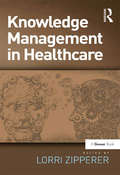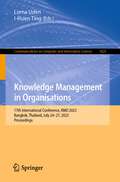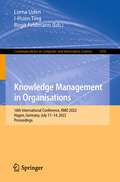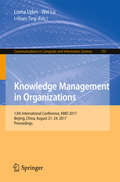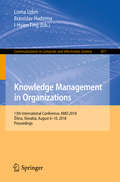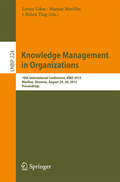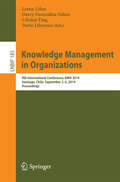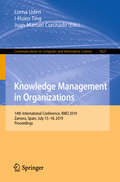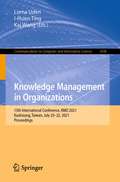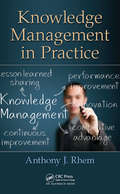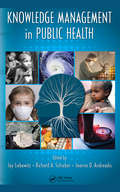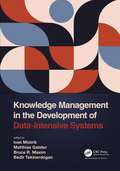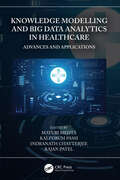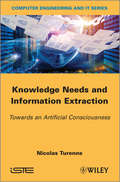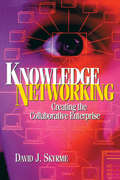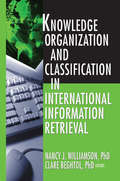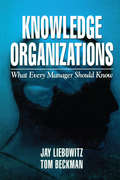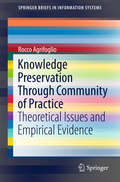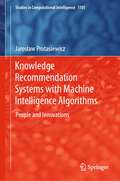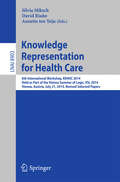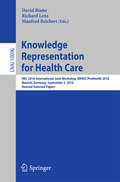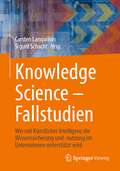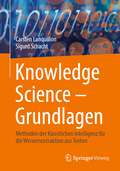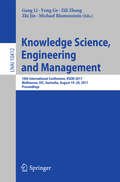- Table View
- List View
Knowledge Management in Healthcare
by Lorri ZippererKnowledge management goes beyond data and information capture in computerized health records and ordering systems; it seeks to leverage the experiences of all who interact in healthcare to enhance care delivery, teamwork, and organizational learning. Knowledge management - if envisioned thoughtfully - takes a systemic approach to implementation that includes the embodiment of a learning culture. Knowledge is then used to support that culture and the knowledge workers within it to encourage them to share what they know, thusly enabling their peers, their organizations and ultimately their patients to benefit from their experience to proactively dismantle hierarchy and encourage sharing about what works, and what doesn’t to focus efforts on improvement. Knowledge Management in Healthcare draws on relevant business, clinical and health administration literature plus the analysis of discussions with a variety of clinical, administrative, leadership, patient and information experts. The result is a book that will inform thinking on knowledge access needs to mitigate potential failures, design lasting improvements and support the sharing of what is known to enable work towards attaining high reliability. It can be used as a general tool for leaders and individuals wishing to devise and implement a knowledge-sharing culture in their institution, design innovative activities supporting transparency and communication to strengthen existing programs intended to enhance knowledge sharing behaviours and contribute to high quality, safe care.
Knowledge Management in Organisations: 17th International Conference, KMO 2023, Bangkok, Thailand, July 24–27, 2023, Proceedings (Communications in Computer and Information Science #1825)
by Lorna Uden I-Hsien TingThis book constitutes the refereed proceedings of the 17th International Conference on Knowledge Management in Organisations, KMO 2023, held in Bangkok, Thailand, during July 24–27, 2023.The 32 full papers included in this book were carefully reviewed and selected from 73 submissions. They were organized in topical sections as follows: Knowledge Transfer & Sharing, Knowledge in Business & Organisation, Digital Transformation and Innovation, Data Analysis and Science, KM and Education, Knowledge Management Process and Model, Information & Knowledge Systems, IT &New Trends in KM, Healthcare.
Knowledge Management in Organisations: 16th International Conference, KMO 2022, Hagen, Germany, July 11–14, 2022, Proceedings (Communications in Computer and Information Science #1593)
by Lorna Uden I-Hsien Ting Birgit FeldmannThis book contains the refereed proceedings of the 16th International Conference on Knowledge Management in Organizations, KMO 2022, held in Hagen, Germany, in July 2022. The 24 full papers and 5 short papers accepted for KMO 2022 were selected from 61 submissions and are organized in topical sections on: knowledge transfer and sharing; knowledge and organization; knowledge and service innovation; industry 4.0; information and knowledge systems; intelligent science; AI and new trends in KM.
Knowledge Management in Organizations: 12th International Conference, KMO 2017, Beijing, China, August 21-24, 2017, Proceedings (Communications in Computer and Information Science #731)
by Lorna Uden, Wei Lu and I-Hsien TingThis book contains the refereed proceedings of the 12th International Conference on Knowledge Management in Organizations, KMO 2017, held in Beijing, China, in August 2017. The theme of the conference was "Emerging Technology and Knowledge Management in Organizations." The 45 contributions accepted for KMO 2017 were selected from 112 submissions and are organized in topical sections on: Knowledge Management Models and Behaviour Studies; Knowledge Sharing; Knowledge Transfer and Learning; Knowledge and Service Innovation; Knowledge and Organization; Information Systems Research; Value Chain and Supply Chain; Knowledge Re-presentation and Reasoning; Data Mining and Intelligent Science; Big Data Management; Internet of Things and Network.
Knowledge Management in Organizations: 13th International Conference, KMO 2018, Žilina, Slovakia, August 6–10, 2018, Proceedings (Communications in Computer and Information Science #877)
by Lorna Uden Branislav Hadzima I-Hsien TingThis book contains the refereed proceedings of the 13th International Conference on Knowledge Management in Organizations, KMO 2018, held in Žilina, Slovakia, in August 2018. The theme of the conference was "Emerging Research for Knowledge Management in Organizations."The 59 papers accepted for KMO 2018 were selected from 141 submissions and are organized in topical sections on: Knowledge management models and analysis; knowledge sharing; knowledge transfer and learning; knowledge and service innovation; knowledge creation; knowledge and organization; information systems and information science; knowledge and technology management; data mining and intelligent science; business and customer relationship management; big data and IoT; and new trends in IT.
Knowledge Management in Organizations
by Lorna Uden Marjan Heričko I-Hsien TingThis book contains the refereed proceedings of the 10th International Conference on Knowledge Management in Organizations, KMO 2015, held in Maribor, Slovenia, in August 2015. The theme of the conference was "Knowledge Management and Internet of Things. " The KMO conference brings together researchers and developers from industry and academia to discuss how knowledge management using big data can improve innovation and competitiveness. The 59 contributions accepted for KMO 2015 were selected from 163 submissions and are organized in topical sections on: knowledge management processes, successful knowledge sharing and knowledge management practices, innovations for competitiveness, knowledge management platforms and tools, social networks and mining techniques, knowledge management and the Internet of Things, knowledge management in health care, and knowledge management in education and research.
Knowledge Management in Organizations
by Lorna Uden Darcy Fuenzaliza Oshee I-Hsien Ting Dario LiberonaThis book contains the refereed proceedings of the 9th International Conference on Knowledge Management in Organizations (KMO) held in Santiago, Chile, during September 2014. The theme of the conference is "Knowledge Management to Improve Innovation and Competitiveness through Big Data. " The KMO conference brings together researchers and developers from industry and academia to discuss and research how knowledge management using big data can improve innovation and competitiveness. The 39 contributions accepted for KMO 2014 were selected from 89 submissions and are organized in sections on: big data and knowledge management, knowledge management practice and case studies, information technology and knowledge management, knowledge management and social networks, knowledge management in organizations, and knowledge transfer, sharing and creation.
Knowledge Management in Organizations: 14th International Conference, KMO 2019, Zamora, Spain, July 15–18, 2019, Proceedings (Communications in Computer and Information Science #1027)
by Lorna Uden I-Hsien Ting Juan Manuel CorchadoThis book contains the refereed proceedings of the 14th International Conference on Knowledge Management in Organizations, KMO 2019, held in Zamora, Spain, in July 2019. The 46 papers accepted for KMO 2018 were selected from 109 submissions and are organized in topical sections on: knowledge management models and analysis; knowledge transfer and learning; knowledge and service innovation; knowledge creation; knowledge and organization; information systems and information science; data mining and intelligent science; social networks and social aspects of KM; big data and IoT; and new trends in IT.
Knowledge Management in Organizations: 15th International Conference, KMO 2021, Kaohsiung, Taiwan, July 20-22, 2021, Proceedings (Communications in Computer and Information Science #1438)
by Lorna Uden I-Hsien Ting Kai WangThis book contains the refereed proceedings of the 15th International Conference on Knowledge Management in Organizations, KMO 2021, held in Kaohsiung, Taiwan, in July 2021. The 28 full papers and 9 short papers accepted for KMO 2021 were selected from 86 submissions and are organized in topical sections on: knowledge management models and analysis; knowledge transfer and learning; knowledge and service innovation; knowledge and organization; information systems and information science; privacy and security; intelligent science and data mining; AI and new trends in IT.
Knowledge Management in Practice
by Anthony J. Rhem"This evidence-based book provides the framework and guidelines that professionals need for working with the contemporary explosion of data that is creating opportunities and challenges to all phases of our society and commerce." –Larry R. Medsker, Research Professor in Physics and Data Science, The George Washington University Knowledge Management in Practice is a resource on how knowledge management (KM) is implemented. It provides specific KM methods, tips, techniques, and best practices to gain competitive advantage and the most from investing in KM. It examines how KM is leveraged by first responders, the military, healthcare providers, insurance and financial services companies, legal firms, human resources departments, merger and acquisition (M&A) firms, and research institutions. Essential KM concepts are explored not only from a foundational perspective but also from a practical application. These concepts include capturing and codifying tacit and explicit knowledge, KM methods, information architecture, search, KM and social media, KM and Big Data, and the adoption of KM. Readers can visit the book’s companion website, KM Mentor (www.KMMentor.com), where they can access: Presentations by industry leaders on a variety of topics KM templates and instruction on executing KM strategy, performing knowledge transfer, and KM assessments and audits KM program and project implementation guidance Insights and reviews on KM tools Guidance on implementing and executing various KM Methods Specialized KM publications A private secure collaboration community for members to discuss ideas and get expert answers and advice
Knowledge Management in Public Health
by Jay Liebowitz Richard A. Schieber Joanne D. AndreadisClose collaboration across agencies and international borders is mandatory for public health officials. A powerful tool for sharing knowledge, knowledge management (KM) can help public health professionals quickly collaborate and disseminate knowledge for solving public health issues worldwide. The latest initiatives for reforming healthcare have put the spotlight on the need for maximizing resources. In addition to providing a platform for sharing knowledge, KM can help healthcare professionals do more with less. One tool, two problems solved. Yet the sharing of knowledge and KM continues to be a major challenge in the public health field. Knowledge Management in Public Health provides a general introduction to KM and social networking in the public health arena. The book begins with coverage of basic principles, components, and methodologies as well as trends and key issues in public health. It includes ten case studies illustrating applications of KM and social networking in public health. The chapters are written by leading individuals from organizations involved in applying KM in public health worldwide. The editors and chapter authors explore the many elements of KM, delineating how and why to start such an initiative. They provide specific examples of the development and value-added benefits of KM in a variety of public health environments. Tough or quick decision making has always benefitted enormously from knowledge based on the maximum amount of pertinent information available at the time—this has not changed. What is new in the present public health environment is the need to do this more often, with fewer personnel available, and increased expectations relative to the services expected by the public. Better use of information under a KM system is well suited to serve that purpose. This book explores the many ways to use KM to anticipate potential health issues and quickly resolve key incidents when they occur.
Knowledge Management in the Development of Data-Intensive Systems
by Ivan Mistrik Matthias Galster Bruce R. Maxim Bedir TekinerdoganData-intensive systems are software applications that process and generate Big Data. Data-intensive systems support the use of large amounts of data strategically and efficiently to provide intelligence. For example, examining industrial sensor data or business process data can enhance production, guide proactive improvements of development processes, or optimize supply chain systems. Designing data-intensive software systems is difficult because distribution of knowledge across stakeholders creates a symmetry of ignorance, because a shared vision of the future requires the development of new knowledge that extends and synthesizes existing knowledge. Knowledge Management in the Development of Data-Intensive Systems addresses new challenges arising from knowledge management in the development of data-intensive software systems. These challenges concern requirements, architectural design, detailed design, implementation and maintenance. The book covers the current state and future directions of knowledge management in development of data-intensive software systems. The book features both academic and industrial contributions which discuss the role software engineering can play for addressing challenges that confront developing, maintaining and evolving systems;data-intensive software systems of cloud and mobile services; and the scalability requirements they imply. The book features software engineering approaches that can efficiently deal with data-intensive systems as well as applications and use cases benefiting from data-intensive systems. Providing a comprehensive reference on the notion of data-intensive systems from a technical and non-technical perspective, the book focuses uniquely on software engineering and knowledge management in the design and maintenance of data-intensive systems. The book covers constructing, deploying, and maintaining high quality software products and software engineering in and for dynamic and flexible environments. This book provides a holistic guide for those who need to understand the impact of variability on all aspects of the software life cycle. It leverages practical experience and evidence to look ahead at the challenges faced by organizations in a fast-moving world with increasingly fast-changing customer requirements and expectations.
Knowledge Modelling and Big Data Analytics in Healthcare: Advances and Applications
by Mayuri Mehta Kalpdrum Passi Indranath Chatterjee Rajan PatelKnowledge Modelling and Big Data Analytics in Healthcare: Advances and Applications focuses on automated analytical techniques for healthcare applications used to extract knowledge from a vast amount of data. It brings together a variety of different aspects of the healthcare system and aids in the decision-making processes for healthcare professionals. The editors connect four contemporary areas of research rarely brought together in one book: artificial intelligence, big data analytics, knowledge modelling, and healthcare. They present state-of-the-art research from the healthcare sector, including research on medical imaging, healthcare analysis, and the applications of artificial intelligence in drug discovery. This book is intended for data scientists, academicians, and industry professionals in the healthcare sector.
Knowledge Needs and Information Extraction: Towards an Artificial Consciousness (Wiley-iste Ser.)
by Nicolas TurenneThis book presents a theory of consciousness which is unique and sustainable in nature, based on physiological and cognitive-linguistic principles controlled by a number of socio-psycho-economic factors. In order to anchor this theory, which draws upon various disciplines, the author presents a number of different theories, all of which have been abundantly studied by scientists from both a theoretical and experimental standpoint, including models of social organization, ego theories, theories of the motivational system in psychology, theories of the motivational system in neurosciences, language modeling and computational modeling of motivation. The theory presented in this book is based on the hypothesis that an individual’s main activities are developed by self-motivation, managed as an informational need. This is described in chapters covering self-motivation on a day-to-day basis, the notion of need, the hypothesis and control of cognitive self-motivation and a model of self-motivation which associates language and physiology. The subject of knowledge extraction is also covered, including the impact of self-motivation on written information, non-transversal and transversal text-mining techniques and the fields of interest of text mining. Contents: 1. Consciousness: an Ancient and Current Topic of Study. 2. Self-motivation on a Daily Basis. 3. The Notion of Need. 4. The Models of Social Organization. 5. Self Theories. 6. Theories of Motivation in Psychology. 7. Theories of Motivation in Neurosciences. 8. Language Modeling. 9. Computational Modeling of Motivation. 10. Hypothesis and Control of Cognitive Self-Motivation. 11. A Model of Self-Motivation which Associates Language and Physiology. 12. Impact of Self-Motivation on Written Information. 13. Non-Transversal Text Mining Techniques. 14. Transversal Text Mining Techniques. 15. Fields of Interest for Text Mining. About the Authors Nicolas Turenne is a researcher at INRA in the Science and Society team at the University of Paris-Est Marne la Vallée in France. He specializes in knowledge extraction from texts with theoretical research into relational and stochastic models. His research topics also concern the sociology of uses, food and environmental sciences, and bioinformatics.
Knowledge Networking: Creating The Collaborative Enterprise
by David SkyrmeKnowledge Networking explains the strategic, organizational and human impact of technologies that support knowledge: the internet, groupware, collaborative technologies. It shows how they can transform organizational practices and help to improve both individual and team performances. Based on proven experience and includes customised toolkits, cases and action plans. From pooling expertise on a sales bid via computer referencing, to improving customer service using the flexible office, the author demonstrates how potential can become practice.Knowledge management is the big management idea currently influencing organizations, and Knowledge Networking explores the global impact of sharing knowledge and expertise. It is a highly practical text which includes customised toolkits, cases and action plans to enable individuals and teams to improve their performance.
Knowledge Organization and Classification in International Information Retrieval
by Nancy Williamson Clare BeghtolLearn step-by-step how to develop knowledge-based products for international use! Knowledge Organization and Classification in International Information Retrieval examines current efforts to deal with the increasing globalization of information and knowledge. International authors walk you through the theoretical foundations and conceptual elements behind knowledge management, addressing areas such as the Internet, multinational resources, translations, and information languages. The tools, techniques, and case studies provided in this book will be invaluable to anyone interested in bridging the international information retrieval language gap. This book is divided into four sections that address major themes for internationalized information and knowledge: "General Bibliographic Systems" discusses how bibliographic classification systems can be adapted for specific subjects, the problems with addressing different language expressions, and the future of these systems "Information Organization in Knowledge Resources" explores knowledge organization and classification, focusing mainly on libraries and on the Internet "Linguistics, Terminology, and Natural Language Processing" analyzes the latest developments in language processing and the design of information retrieval tools and resources "Knowledge in the World and the World of Knowledge" addresses the ontological foundations of knowledge organization and classification and knowledge management in organizations from different cultures With this book, you&’ll gain a better understanding about the international efforts to globalize: the Dewey Decimal Classification the Library of Congress Classification the Universal Decimal Classification multilingual thesauri Web directories of education-related resources human language technology metadata schemas the North American Industry Classification Figures, tables, charts, and diagrams elucidate the concepts in Knowledge Organization and Classification in International Information Retrieval. Information educators and practitioners as well as specialists in classification and knowledge organization will find this book valuable for its focus on the problems of-and solutions for-information retrieval for specific linguistic, cultural, and domain communities of discourse.
Knowledge Organizations: What Every Manager Should Know
by Jay Liebowitz Thomas J. BeckmanFor knowledge management to be successful, the corporate culture needs to be adapted to encourage the creation, sharing, and distribution of knowledge within the organization. Knowledge Organizations: What Every Manager Should Know provides insight into how organizations can best accomplish this goal. Liebowitz and Beckman provide the information companies need for evaluating and planning the steps and processes that will transform their existing organization infrastructure into a "knowledge-based" organization. This easy-to-read guide includes many vignettes, examples, and short cases of organizations involved in knowledge management.
Knowledge Preservation Through Community of Practice
by Rocco AgrifoglioThis book links knowledge management literature and information systems research to explore the process of knowledge preservation within a community of practice. It contributes to existing literature in different ways. First, it provides a conceptualization of the "community knowledge preservation" process. In contrast to previous knowledge management research, knowledge preservation is thus viewed as a process in its own right rather than an integral part of knowledge creation and sharing. Furthermore, the book also investigates how communities of practice preserve knowledge, by identifying the main mechanisms and tools enabling members to select, store and actualize the explicit and tacit forms of collective knowledge. More in general, the book presents guidance on how to use communities of practice to ensure the preservation of knowledge in development processes, for individuals and organizations alike.
Knowledge Recommendation Systems with Machine Intelligence Algorithms: People and Innovations (Studies in Computational Intelligence #1101)
by Jarosław ProtasiewiczKnowledge recommendation is an timely subject that is encountered frequently in research and information services. A compelling and urgent need exists for such systems: the modern economy is in dire need of highly-skilled professionals, researchers, and innovators, who create opportunities to gain competitive advantage and assist in the management of financial resources and available goods, as well as conducting fundamental and applied research more effectively.This book takes readers on a journey into the world of knowledge recommendation, and of systems of knowledge recommendation that use machine intelligence algorithms. It illustrates knowledge recommendation using two examples. The first is the recommendation of reviewers and experts who can evaluate manuscripts of academic articles, or of research and development project proposals. The second is innovation support, which involves bringing science and business together by recommending information that pertains to innovations, projects, prospective partners, experts, and conferences meaningfully.The book also describes the selection of the algorithms that transform data into information and then into knowledge, which is then used in the information systems. More specifically, recommendation and information extraction algorithms are used to acquire data, classify publications, identify (disambiguate) their authors, extract keywords, evaluate whether enterprises are innovative, and recommend knowledge.This book comprises original work and is unique in many ways. The systems and algorithms it presents are informed by contemporary solutions described in the literature - including many compelling, novel, and original aspects. The new and promising directions the book presents, as well as the techniques of machine learning applied to knowledge recommendation, are all original.
Knowledge Representation for Health Care
by Silvia Miksch David Riaño Annette Ten TeijeThis book constitutes the refereed proceedings of the 6th International Workshop on Knowledge Representation for Health Care, KR4HC 2014, held as part of the Vienna Summer of Logic, VSL 2014, in Vienna, Austria, in July 2014. The workshop aimed at attracting the interest of novel research and advances contributing in the definition, representation and exploitation of health care knowledge in medical informatics. The 12 revised full research papers and 4 short papers presented in this book were carefully reviewed and selected from 26 submissions.
Knowledge Representation for Health Care
by David Riaño Richard Lenz Manfred ReichertThis book constitutes the thoroughly refereedpost-workshop proceedings of two workshops held at the International Conferenceon Artificial Intelligence in Medicine, AIME 2015, held in Pavia, Italy, inJune 2015: the 7th International Workshop on Knowledge Representation forHealth Care, KR4HC 2015, and the 8th International Workshop on Process-orientedInformation Systems in Healthcare, ProHealth 2015. The 10 revised full papers were carefullyreviewed and selected from 26 submissions. The papers are organized in topicalsections on knowledge-driven health IT and simulation, clinical guideline andclinical pathway support, mobile process and decision support, and healthinformation systems and clinical data.
Knowledge Representation, Reasoning, and the Design of Intelligent Agents
by Dr Michael Gelfond Yulia KahlKnowledge representation and reasoning is the foundation of artificial intelligence, declarative programming, and the design of knowledge-intensive software systems capable of performing intelligent tasks. Using logical and probabilistic formalisms based on answer set programming (ASP) and action languages, this book shows how knowledge-intensive systems can be given knowledge about the world and how it can be used to solve non-trivial computational problems. The authors maintain a balance between mathematical analysis and practical design of intelligent agents. All the concepts, such as answering queries, planning, diagnostics, and probabilistic reasoning, are illustrated by programs of ASP. The text can be used for AI-related undergraduate and graduate classes and by researchers who would like to learn more about ASP and knowledge representation.
Knowledge Science – Fallstudien: Wie mit Künstlicher Intelligenz die Wissenssicherung und -nutzung im Unternehmen unterstützt wird
by Carsten Lanquillon Sigurd SchachtDer Arbeitsplatz der Zukunft wird immer stärker durch die Wissensarbeit geprägt. Knowledge Science beschäftigt sich mit Konzepten, Methoden und Prozessen zur systematischen Erzeugung, Extraktion, Speicherung und Bereitstellung von Wissen zur Lösung von Problemen und lässt sich somit dem Wissensmanagement zuordnen. Kognitive Assistenten sorgen dafür, das richtige Wissen zur richtigen Zeit in der richtigen Art und Weise seinen Anwendern und Anwenderinnen bereitzustellen. Damit dies gelingen kann, kommen inzwischen zahlreiche Methoden der Künstlichen Intelligenz (KI) zur Unterstützung unterschiedlicher Aufgaben des Wissensmanagements zum Einsatz.Der InhaltWie lassen sich mit KI-Methoden die Wissenssicherung und Wissensnutzung in Unternehmen unterstützen? Dieses Buch charakterisiert den Arbeitsplatz der Zukunft und stellt die Bedeutung der Ressource Wissen und deren Management in den Vordergrund. Ziel ist es nicht, mittels KI den Menschen zu ersetzen, sondern ihn mittels kognitiver Assistenten bestmöglich bei seiner Arbeit zu unterstützen. Welche Bereiche des Unternehmens können mit Methoden der Künstlichen Intelligenz optimiert oder gänzlich transformiert werden? Welche Schritte sind sowohl organisatorisch als auch technisch notwendig und wie werden einzelne Methoden in den Bereichen tatsächlich durchgeführt? In diesem Buch werden die Methoden der KI anhand konkreter Fallstudien mit einer großen Bandbreite erläutert und entmystifiziert:Assistenzsysteme, die wie ein Mensch lernenWissenssicherung durch Smart Expert Debriefings Kognitive Assistenzsysteme für die Trendanalyse Kognitive Assistenzsysteme im ProjektmanagementMethoden der KI in industriellen AnwendungenDie ZielgruppenUnternehmer, Prozessverantwortliche und Fachanwender, die Methoden der KI in ihrem Unternehmen oder ihren Fachbereichen nutzen wollen.IT-Manager, IT-Experten und Data Scientists, die KI-basierte Lösungen im Wissensmanagement umsetzen Studierende im Bereich KI und Data Science
Knowledge Science – Grundlagen: Methoden der Künstlichen Intelligenz für die Wissensextraktion aus Texten
by Carsten Lanquillon Sigurd SchachtKnowledge Science beschäftigt sich mit Konzepten, Methoden und Prozessen zur systematischen Erzeugung, Extraktion, Speicherung und Bereitstellung von Wissen zur Lösung von Problemen und lässt sich somit dem Wissensmanagement zuordnen. Kognitive Assistenten sorgen dafür, das richtige Wissen zur richtigen Zeit in der richtigen Art und Weise seinen Anwendern und Anwenderinnen bereitzustellen. Damit dies gelingen kann, kommen inzwischen zahlreiche Methoden der Künstlichen Intelligenz (KI) zur Unterstützung unterschiedlicher Aufgaben des Wissensmanagements zum Einsatz.
Knowledge Science, Engineering and Management: 10th International Conference, KSEM 2017, Melbourne, VIC, Australia, August 19-20, 2017, Proceedings (Lecture Notes in Computer Science #10412)
by Gang Li, Yong Ge, Zili Zhang, Zhi Jin and Michael BlumensteinThis book constitutes the refereed proceedings of the 10th International Conference on Knowledge Science, Engineering and Management, KSEM 2017, held in Melbourne, Australia, in August 2017. The 35 revised full papers and 12 short papers presented were carefully reviewed and selected from 134 submissions. The papers are organized in the following topical sections: text mining and document analysis; formal semantics and fuzzy logic; knowledge management; knowledge integration; knowledge retrieval; recommendation algorithms and systems; knowledge engineering; and knowledge representation and reasoning.
